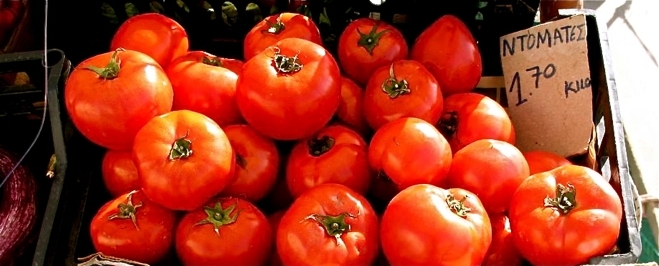Don’t underestimate the tomato, it may be one of the most important ingredient of the Greek Diet.
I love tomatoes! So much so, that I dedicated half the name of my blog to tomatoes. But there is another reason: they are a fundamental part of Greek food contributing to many of the health benefits of the diet.
Tomatoes didn’t exist in ancient Greece and it is said that they arrived in Europe in the 16th century. Nevertheless tomatoes are one of the most important parts of Greek cuisine along with olive oil (hence the name of the blog).
Tomatoes or some form of tomatoes are added to the majority of meals in Greece. Apart from the well-known Greek salad, tomatoes are present in many dishes. In the summer, fresh tomato is combined with seasonal vegetables to make lathera; green beans, okra, peas, briami-vegetable summer medley, and eggplant to name a few-see some recipes here. In the winter when they didn’t have fresh tomatoes, they would use tomato paste to provide that redness to meat and to winter vegetables such as cauliflower or spinach. Today, apart from the fresh tomatoes you can find canned tomatoes, not only convenient for cooking but in many cases may have higher concentrations of lycopene (a phytochemical- carotenoid, rich in antioxidants).
I associate fresh tomatoes with Greek summers on the beach. We would eat fresh tomatoes with a touch of salt, some cheese and bread, and it just felt like the most delicious meal. I don’t know if it was the tomatoes or the sea, but to this day the taste of those tomatoes so many summers ago is what I’m always trying to relive when I bite into the first tomatoes of the season. Unfortunately, today it’s not so easy to find those juicy red tomatoes, in many cases they are grainy with a dull orange color and tasteless. When I do find good tomatoes, I buy too many and then I have to find some way to use them all, and I have tried everything! In the next few posts I’ll be sharing recipes with tomatoes.
Despite the fact that we use tomatoes so often, I feel that they are sometimes underestimated, in a way taken for granted-just another ingredient, but they shouldn’t be and here’s why: We know that tomato is rich in vitamin C, with one tomato providing 1/3 of our daily needs. It is also a good source of fiber and potassium. Tomatoes are also rich in lycopene, the phytochemical with antioxidant properties that appears to protect from heart disease and some forms of cancer. And when tomatoes are cooked with olive oil (as it is with Greek food) lycopene absorption was increased by 80%. This supports a recent study that showed that adding monounsaturated fat based dressing (olive oil is one of the best sources) to your salad increases the absorption of lycopene and other carotenoids from the vegetables. And lets not forget that vitamin C also increases the absorption of iron from other foods.
And since it is summer, if you happen to be in Greece and particularly on the island of Santorini, look for the Santorini Cherry Tomato (first photo above), known as Tomataki Santorinis, which has applied for PDO status. This variety is said to be first cultivated here in 1875, and it is unique because it grows in the dry Santorini environment and has a very concentrated flavor compared to other tomatoes.



Been eating Mediterranean for a few months. I found my nutritional “home”. Love your blog and insight!